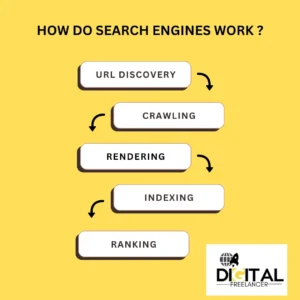The marketing and business sectors are buzzing around search engine optimization. This is because search engine optimization can bring organic traffic to a website and help a business grow in the long run without having to spend more on paid ads.
To learn more about search engine optimization, we should first understand how search engines work.
Table of Contents
What is a search engine?
A search engine is a programmed tool or an answering machine that delivers webpages relevant to the intent of a search query on Google. A search engine connects the searcher with the publisher based on certain algorithms or criteria such as relevancy, quality content, and other ranking factors.
Google is the largest search engine having a worldwide market share of 90.91% as of April 2024.
The other search engines in the market are Bing, Yandex, Baidu, Yahoo, DuckDuckgo, and Ask.com, etc.
How do search engines work?
Steps followed by a search engine to answer a search query of its user
A search engine follows 5 major steps to fetch a webpage most relevant to the query of its users.
- URL discovery
- Crawling
- Rendering
- Indexing
- Ranking
URL Discovery:-
As the name suggests every time a new webpage is published, it is identified by the search engine. This happens when an internal page is linked to the newly published page.
Crawling:-
The process by which web crawlers or spiders read and understand the complete content of a webpage is called crawling. When a homepage is crawled by the web crawlers, they crawl all other pages that are linked with it. So for a web page to be crawled, it must be linked internally with other pages of the website.
If any web page is not internally linked it is called an orphan page and it becomes difficult for a crawler to crawl that page. The existence of that page becomes unknown although it has great content.
After the content of a web page is scanned and understood by the crawler, it is then sent to the index database based on its relevancy.
Rendering :-
Rendering happens when the HTML data of a webpage is converted to a rendered format so that Google’s database can understand and index it.
Indexing :-
Google stores data like text, images and videos of a webpage in its database. If the webpage meets the criteria of Google then it will be indexed.
This is an important step because if the content is not indexed then it will not be visible to the users on the SERP or results page.
A detailed view of how indexing happens
When a user searches for something on a search engine, the web crawlers start crawling the web. Google checks for a duplicate webpage. A duplicate webpage is a copy of an original webpage on the internet.
If the duplicate content occurs in another domain that is if two different websites have the same or similar content ,it is called an external duplicate and the duplicate content will not be indexed.
If a duplicate content occurs in the same domain that is if two pages of the same website have the same or similar content, the crawlers will check the canonical URL.
A canonical URL is a URL given to the original webpage so that Google can differentiate an original webpage with its duplicate.
If the canonical URL is the same as the URL of the web page , it will be indexed and the duplicate page will be excluded.
If Google finds a webpage relevant to the search query of a user, as original content, then it checks for a user selected canonical URL.
A user selected canonical URL is a canonical URL manually typed by the user. If it is present then Google declares the same as canonical URL and the webpage gets indexed.
If the user selected canonical URL is missing, Google will declare some other web page that is relevant to the content and in this case the original page might get excluded from being indexed.
So, it is necessary to have a user selected canonical URL to index your original webpage on Google.
Reasons for a webpage to be excluded from crawling or indexing
- The web page could be blocked by robots tag.
- The web page could be disallowed by robots.txt file.
- Webpages that have logins may not be allowed to crawl or index.
- If your webpage has duplicate content (i.e) same content as the original page and if it does not have a proper canonical tag,then it may not be crawled or indexed.
- Internal server issues stop webpage from being crawled.
- Bad HTTPS response codes like 4xx and 5xx stop pages from being crawled or indexed.
- If the page does not have any internal link then it becomes an orphan page and Google finds it difficult to crawl or index the orphan page.
- If there are no backlinks referring to a particular page,then that page may not be indexed or ranked.
- If the website is penalised by Google for not following the guidelines or by following link scheme then the webpages may not be crawled or indexed.
- If the content is of low quality the page may not be crawled or indexed.
Ranking :-
Ranking is basically the position a website gets by Google on its SERP or search engine results page. The higher position a website secures on the SERP, the more are the chances for it to be clicked. The more the click through rate (CTR) is the higher are the chances of conversion.
So, it is very important for a website to be on the top position of a SERP for more visibility and revenue generation.
There are more than 200 factors that Google considers in ranking a webpage.
Some of the important factors are:-
- A webpage should have compelling content or high quality content with consistent publishing.
- Topical Expertise of the webpage in its niche
- Use of relevant keywords in HTML meta tags
- Backlinks from authoritative sites.
- A good user experience and engagement
- Trustworthiness
- Mobile Friendliness
- Page load speed
- Security with HTTPS
Let’s break this down to learn how each of them helps in ranking.
High quality content
The intention behind creating content is to bring returning readers to your website to increase the traffic organically.This can be achieved only if your content is useful to the reader.A high quality content is content that adds value to the topic and is worth reading.Google loves high quality content that is helpful to its readers.So the chances of your content to rank is high.
Topical expertise
When you write content about a topic in your niche, people related to your niche tend to read information about it.If your content shows your expertise in your niche, people will regularly read it to gain valuable insights. When more and more people start engaging with your content, Google will consider you to be an expert in a topic or niche and it will try to rank your web pages higher.
Use of relevant keywords in Meta Tags
When a user searches a query, Google bots start crawling the websites related to the search query so it important to place keywords in the meta tags for crawlers to crawl and index your webpage on the SERP. Relevancy is an important factor in ranking.
Backlinks from authoritative sites
Backlinks bring traffic to your web pages from external websites. The more links you obtain from relevant external websites, the more the authority of your website increases. The websites with high authority rank higher on search engine results pages.
User experience and engagement
The websites that have great user experience, navigation, performance, responsive design, and speed are more likely to be ranked higher on SERP.
Trustworthiness
When many people interact with your content and share your content on social media,Google considers your content trustworthy and thus starts to rank your webpage higher.
Mobile Friendliness
Smartphones are now commonly used for various tasks.The mobile-friendliness of a website is considered one of the crucial factors in ranking.
The visual and structural appeal of the website, layout adaptation, readability, and optimized media help a webpage to rank higher. Mobile-friendly websites attract and retain more visitors.Google ranks these pages higher on the results page.
Page Load Speed
If the loading speed of a website is poor, people might get frustrated and leave the page. Core web vitals are a set of metrics used to calculate page loading speed. If a website passes the core web vitals then the website is as per the Google recommendations. So the loading speed of a website or a webpage is an important ranking factor.
Security with HTTPS
Google favours HTTPS sites in Google search rankings because HTTPS is the secure version of HTTP and users trust secure sites more and this reduces the bounce rate on the websites that have HTTPS. HTTPS guards against data interception and manipulation.
Thus, understanding the workings of a search engine is important for any business owner or an SEO analyst to perform effective search engine optimization to enhance the awareness of a brand, build trust among its users, and generate more conversions by ranking the website higher on the search engine results page.


